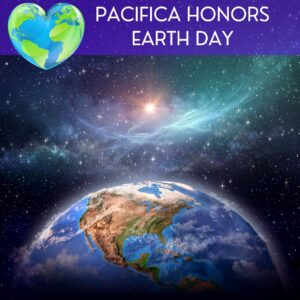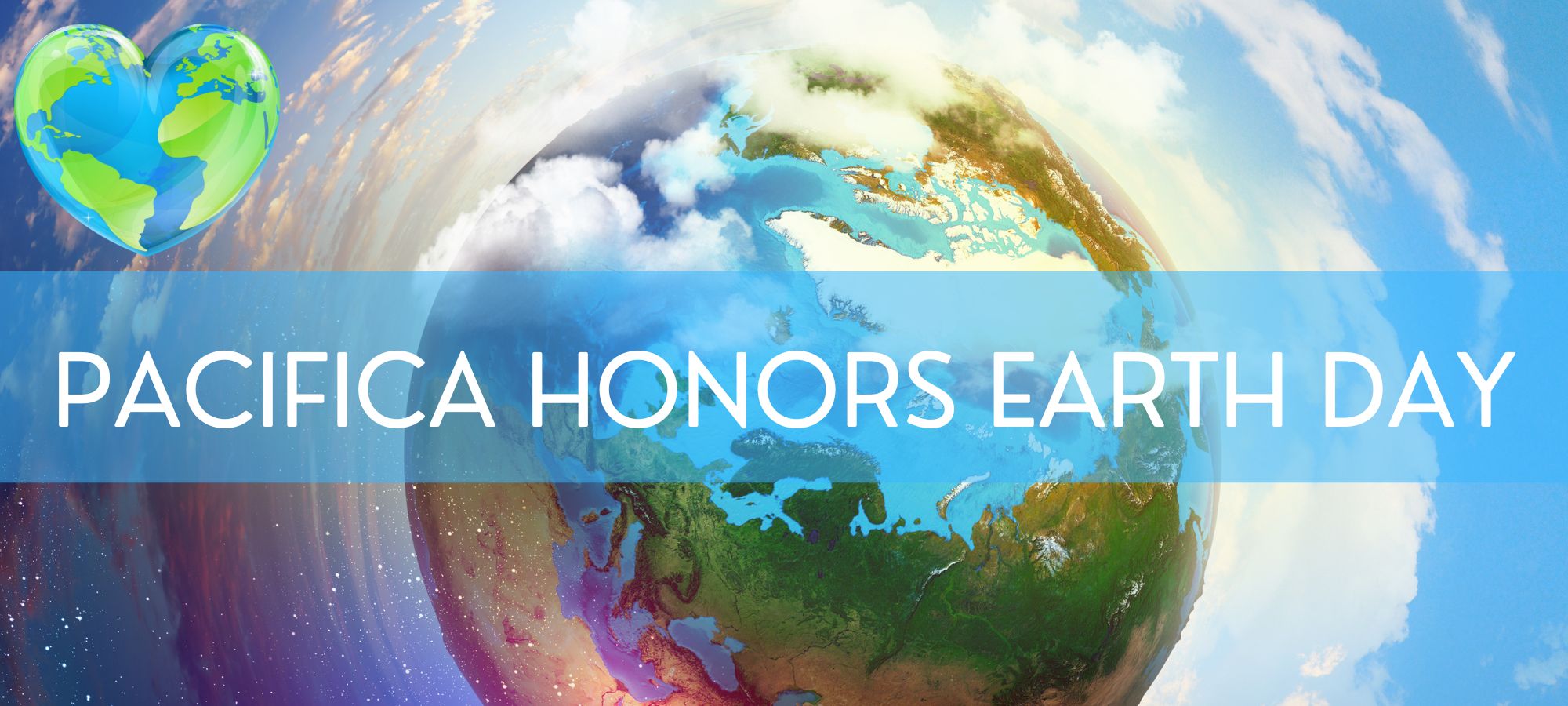As we celebrate Earth Day, we reflect on our collective and individual relationship with nature, our commitment to sustainability, and the ways we can continue to reduce our environmental impact and fight for the necessary changes to address the needs of our planet. At Pacifica Graduate Institute, we believe that promoting sustainability, protection, and restoration, as well as connecting with the awe and wonder of nature are essential parts of our mission of tending the soul of the world. We believe in the power of education to inspire positive change in the world and meet the urgent environmental challenges we face. Our programs encourage students to explore ecological sustainability, environmental justice, and social responsibility.
Ecopsychology at Pacifica
 Pacifica’s M.A./Ph.D. Program in Depth Psychology with Specialization in Community, Liberation, Indigenous, and Eco-Psychologies Program (CLIE) understands “ecopsychology as a corrective to Western psychology’s neglect of the impact of built and natural environments on the human psyche and on communities, and of the human impacts on the environment. Since the well-being of humans and the natural world are inextricably connected, ecopsychologists are critically needed to heal human/nature divides, creating pathways for human/nature/animal relations, as well as working to create the increased awareness that is a necessary step to the restoration of habitats and the creation of built and natural environments that are sustainable.” To learn more about CLIE’s ecopsychology visit here.
Pacifica’s M.A./Ph.D. Program in Depth Psychology with Specialization in Community, Liberation, Indigenous, and Eco-Psychologies Program (CLIE) understands “ecopsychology as a corrective to Western psychology’s neglect of the impact of built and natural environments on the human psyche and on communities, and of the human impacts on the environment. Since the well-being of humans and the natural world are inextricably connected, ecopsychologists are critically needed to heal human/nature divides, creating pathways for human/nature/animal relations, as well as working to create the increased awareness that is a necessary step to the restoration of habitats and the creation of built and natural environments that are sustainable.” To learn more about CLIE’s ecopsychology visit here.
Pacifica Extension and International Studies: Advanced Training Certificate in Ecopsychology
The Advanced Training Certificate in Ecopsychology, offered online over 13 weeks, has the distinct advantage of combining four perspectives from four internationally renowned authors, educators, and transformational leaders in the fields of Ecopsychology and Ecotherapy. Ecopsychology brings ecology and psychology together to create novel and exciting approaches to the urgent needs of our time. Although its most visible face is the practice of Ecotherapy, which emphasizes the synergy between human well-being and the health of the planet, a number of other avenues have been developed, including those involving depth-psychological, multicultural, transpersonal, community, and liberatory engagement with earthly places, thereby cultivating personal and cultural transformation. The next Ecopsychology Certificate begins in January. Register now here.
“There are many ways that deep, heart-open communication with any aspect of the rest of nature can be profoundly healing to human beings, but there are many more issues that ecotherapy can also help us deal with.” – Linda Buzzell, LMFT, an instructor for Pacifica’s Ecopsychology Certificate. Read more here.
Andy Fisher, Ph.D., is a major figure in ecopsychology, having tracked and reflected on the development of the field for the last three decades. He co-teaches Pacifica’s “Advanced Training Certificate: Ecopsychology, and says, “Ecopsychology is often framed as being about the mental health benefits of connecting with the natural world, but that leaves the larger critical picture untouched. Historically speaking, the soul gets taken out of nature, turning it into brute matter, so that industry can get going with the bulldozers. To put the soul back into the natural world puts the brakes on the bulldozers, and all the other things necessary for the operation of the modern capitalistic world. We also have to remember that the original split between psyche and nature came about through violent historical processes, clearing people from the land to get access to the wealth there and to create landless workers. So I add ‘society’ to the terms psyche and nature, and this gets to my second sense of why ecopsychology is radical.” Read our interview with Andy here.
Pacifica’s Stewardship of the Land
Since 2022, Pacifica Graduate Institute has reduced our carbon emissions by 61,358 pounds, conserved 76,970 gallons of water, and saved 26,140 pounds of wood by using DocuSign to replace paper contracts printing, mailing, and filing. This act alone compares to saving 197,502 pages of paper and conserving 78 trees.
Pacifica strives to be the best stewards of the earth and our campuses as is possible. Our Campus Operations team shares these facts with us:
- The Ladera campus swimming pool is used as a holding reservoir for rainwater that is collected from the roof of the Facilities building. The water is then used to irrigate plants and vegetation across the property saving approximately 100-150,000 gallons a year on treated water.
- No pesticides are used on Ladera campus, and the vegetation is nearly 100% organic.
- Mulching, propagation, and trimmings from campus are utilized to support new and ongoing growth across campus.
- Organic fresh herbs and fruit trees are used and enjoyed by students, faculty, and staff.
- In the past year, approximately 20,000 pounds of lemons have been donated to SB County Foodbank.
- Groundskeepers are water conscious and focus on drought tolerant landscaping. They propagate cuttings of existing succulents on campus.
- Pacifica has converted to filtered water dispensers to supplement bottled water stations across campus. Students and employees are encouraged to refill water bottles rather than use one time use plastic bottles. At the Ladera campus there are 12 water dispensers, 7 at Lambert. The most recently installed machine tracks the number of bottles saved, which currently displays 7199 saved to date.
Pacifica’s recent Campus Utilization Study focused on enhancing ecological sustainability across our campuses. This initiative ensures efficient and sustainable use of our physical spaces and embodies our commitment to environmental stewardship.
In honor of Earth Day, we invite you to join us in celebrating the natural beauty of our planet and renewing our commitment to protecting it for future generations. We encourage you to take action in your own life, whether by reigniting your interconnectedness with nature, reducing your energy consumption and footprint, or being an advocate for sustainability and change in your communities and the larger-scale systems that are environmentally harmful. Let’s work towards a more sustainable and equitable world and continue tending the soul of the world.

Angela Borda is a writer for Pacifica Graduate Institute, as well as the editor of the Santa Barbara Literary Journal. Her work has been published in Food & Home, Peregrine, Hurricanes & Swan Songs, Delirium Corridor, Still Arts Quarterly, Danse Macabre, and is forthcoming in The Tertiary Lodger and Running Wild Anthology of Stories, Vol. 5.


